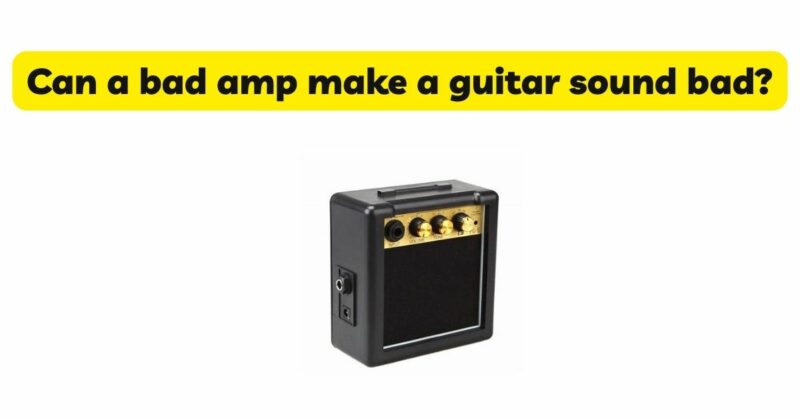The relationship between a guitar and an amplifier is crucial in shaping the overall sound and tone of the instrument. While the guitar itself plays a significant role in producing desirable tones, the amplifier also plays a vital part. In this article, we will explore the impact of a bad amp on the sound quality of a guitar. We will discuss the potential issues that arise from using a poor-quality or mismatched amplifier and how it can affect the overall sound, tone, and playing experience. By understanding these factors, you can make informed decisions when choosing the right amp for your guitar.
- Signal Integrity and Clarity: A bad amp can compromise the signal integrity of the guitar, leading to a degraded and muffled sound. A low-quality amplifier may introduce noise, distortion, or interference into the signal chain, resulting in a loss of clarity and definition. This can mask the nuances and intricacies of the guitar’s tone, making it sound dull and unresponsive.
- Tone Shaping and Equalization: An amplifier’s tone controls and equalization capabilities significantly impact the guitar’s sound. A bad amp may lack the necessary tone shaping options, such as bass, mid, and treble controls, or offer poor-quality components that cannot accurately adjust the frequency response. This limitation can prevent you from achieving the desired tonal balance and shaping the sound to suit your preferences.
- Dynamic Response and Articulation: A high-quality amp responds well to the dynamics and subtleties of your playing, allowing for expressive techniques such as fingerpicking, bends, and vibrato to be accurately reproduced. In contrast, a bad amp may lack the necessary responsiveness, resulting in a flat, lifeless sound. The lack of dynamic range and poor articulation can make the guitar sound uninspiring and hinder your ability to convey emotion through your playing.
- Distortion and Overdrive: Distortion and overdrive play a significant role in shaping the guitar’s tone in various genres. A bad amp may struggle to produce pleasing distortion or overdrive effects, leading to a harsh, grainy, or unnatural sound. The inability to achieve the desired levels of saturation and sustain can greatly impact the guitar’s overall character and limit your ability to explore different sonic territories.
- Frequency Response and Tonal Balance: A bad amp can have an adverse effect on the frequency response and tonal balance of the guitar. Poor-quality amplifiers may emphasize or attenuate certain frequencies, resulting in an uneven or unbalanced sound. This can make the guitar sound boomy, tinny, or lacking in certain frequency ranges, detracting from the overall tonal richness and clarity.
- Speaker Compatibility and Amplifier Power: The speaker compatibility and power handling capabilities of an amp are crucial factors in achieving optimal sound quality. Using a bad amp that is not well-matched with the guitar’s impedance or lacks the necessary power can lead to distortion, speaker damage, or an overall compromised sound. Insufficient power may result in a lack of headroom, limiting your ability to play with dynamics and clarity.
- Build Quality and Components: A bad amp is often the result of poor build quality and low-quality components. These factors can lead to reliability issues, shorter lifespan, and compromised sound quality. Components such as transformers, capacitors, and resistors play a critical role in shaping the sound of an amplifier. Subpar components can introduce unwanted noise, instability, or tonal degradation, making the guitar sound subpar.
- Personal Perception and Playing Experience: The perception of a “bad” amp can vary depending on individual preferences, playing style, and musical genres. While some players may find that a low-quality amp limits their ability to express themselves and achieve the desired tone, others may appreciate the unique character and limitations of such amps. It is essential to consider personal preferences and the specific requirements of your playing style when evaluating the impact of a bad amp on your guitar’s sound.
Conclusion: While a guitar is the primary source of tone, the amplifier significantly influences the overall sound and playing experience. A bad amp can compromise the signal integrity, tone shaping capabilities, dynamic response, and tonal balance of a guitar, resulting in an unsatisfactory sound. It is crucial to choose an amplifier that is well-matched with your guitar, offers reliable build quality, and provides the necessary features to shape and enhance your desired tone. By understanding the potential drawbacks of a bad amp and considering the impact on your playing experience, you can make informed decisions to ensure a harmonious combination of guitar and amplifier that brings out the best in your musical expression.


